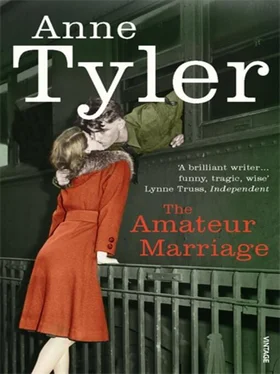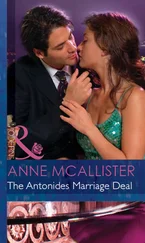The others watched after him — his mother and Mrs. Brunek, and Carl or Paul or Peter, and little old Miss Pelowski, who chanced to be approaching just as Michael and the four girls came barreling out the door. “What…?” Miss Pelowski asked. “What on earth…? Where…?”
Michael didn’t even slow down. He was halfway up the block now, with three girls trailing him and a fourth one at his side. She clung to the crook of his left arm and skimmed along next to him in her brilliant red coat.
Even then, Miss Pelowski said later, she had known that he was a goner.
“Parade” was too formal a word, really, for the commotion on Dubrowski Street. It was true that several dozen young men were walking down the center of the pavement, but they were still in civilian clothes and they made no attempt to keep in step. The older of John Piazy’s sons wore John’s sailor cap from the Great War. Another boy, name unknown, had flung a regulation Army blanket around his shoulders like a cape. It was a shabby, straggly, unkempt little regiment, their faces chapped, their noses running in the cold.
Even so, people were enthusiastic. They waved homemade signs and American flags and the front page of the Baltimore Sun. They cheered at speeches — any speeches, any rousing phrases shouted over their heads. “You’ll be home by New Year’s, boys!” a man in earmuffs called, and “New Year’s Day! Hurray!” zigzagged through the crowd.
When Michael Anton showed up with four girls, everybody assumed he was enlisting too. “Go get ’em, Michael!” someone shouted. Though John Piazy’s wife said, “Ah, no. It would be the death of his mother, poor soul, with all she’s had to suffer.”
One of the four girls, the one in red, asked, “ Will you be going, Michael?” An outsider, she was, but very easy on the eyes. The red of her coat brought out the natural glow of her skin, and a bandage on her temple made her look madcap and rakish. No wonder Michael gave her a long, considering stare before he spoke.
“Well,” he said finally, and then he kind of hitched up his shoulders. “Well, naturally I will be!” he said.
A ragged cheer rang out from everyone standing nearby, and another of the girls — Wanda Bryk, in fact — pushed him forward until he had merged with the young men in the street. Leo Kazmerow walked on his left; the four girls scurried along the sidewalk on his right. “We love you, Michael!” Wanda cried, and Katie Vilna called, “Come back soon!” as if he were embarking for the trenches that very instant.
Then Michael was forgotten. He was swept away, and other young men replaced him: Davey Witt, Joe Dobek, Joey Serge. “You go show those Japs what we’re made of!” Davey’s father was shouting. For after all, a man was saying, who could tell when they’d have another chance to get even over Poland? An old woman was crying. John Piazy was telling everybody that neither one of his sons knew the meaning of the word “fear.” And several people were starting in on the where-were-you-when-you-heard discussion. One had not heard till that morning; he’d been burying his mother. One had heard first thing, the first announcement on the radio, but had dismissed it as another Orson Welles hoax. And one, a woman, had been soaking in the bathtub when her husband knocked on the door. “You’re never going to believe this,” he’d called. “I just sat there,” she said. “I just sat and sat. I sat until the water got cold.”
Wanda Bryk returned with Katie Vilna and the brown-haired girl, but not the girl in red. The girl in red had vanished. It seemed she’d marched off to war with Michael Anton, somebody said.
They did all notice — those in the crowd who knew Michael. It was enough of a surprise so they noticed, and remarked to each other, and remembered for some time afterward.
Word got out, the next day, that Leo Kazmerow had been rejected because he was color-blind. Color-blind! people said. What did color have to do with fighting for your country? Unless maybe he couldn’t recognize the color of someone’s uniform. If he was aiming his gun in battle, say. But everyone agreed that there were ways to get around that. Put him on a ship! Sit him behind a cannon and show him where to shoot!
This conversation took place in Anton’s Grocery. Mrs. Anton was answering the phone, but as soon as she hung up, someone asked, “And what’s the news of Michael, Mrs. Anton?”
“News?” she said.
“Has he left yet?”
“Oh, Michael’s not going anyplace,” she said.
They slid their eyes toward each other — Mrs. Pozniak, Mrs. Kowalski, and one of Mrs. Kowalski’s daughters. But nobody wanted to argue. Mrs. Anton had lost her husband in 1935, and then her firstborn son two years later — handsome, charming Danny Anton, dead of a progressive disease that took him away inch by inch and muscle by muscle. Mrs. Anton had been a changed woman ever since, and who could blame her?
Mrs. Pozniak asked for Cream of Wheat, Fels Naphtha, and a tin of Heinz baked beans. Mrs. Anton set each item flatly on the counter. She was a straight-faced woman, gray all over. Not just her hair was gray but her dull, slack skin and her lusterless eyes and her stretched-out, pilled, man’s sweater worn over a gingham dress. She had a way of looking past her customers’ shoulders while she dealt with them, as if she hoped someone else would show up, someone less disappointing.
Then the bell on the door tinkled and in burst a girl in a red coat, carrying a tissue-wrapped parcel. “Mrs. Anton?” she said. “Do you remember me?”
Mrs. Pozniak hadn’t completed her order. She turned, one finger poised on her grocery list, and opened her mouth to protest.
“Pauline Barclay,” the girl explained. “I cut my forehead and your son gave me a bandage. I’ve knitted him a scarf. I hope I’m not too late.”
“Too late for what?” Mrs. Anton asked.
“Has Michael left for the front yet?”
“The front?”
Mrs. Anton pronounced the word with a little halt, a little different sound to the o . It seemed possible that she was picturing the front of a room or a piece of furniture.
Before Pauline could elaborate, the door tinkled open again and here came Michael in his shaggy plaid jacket. He must have caught sight of Pauline from the street; you could tell by his artificial start of surprise. “Oh! Pauline! It’s you!” he said. (He’d never have made an actor.)
“I knitted you a warm scarf,” she told him. She held up her parcel in both gloved hands; she tilted her fine-boned, delicate face. The little store was so crowded by now that they were standing almost nose to nose.
Michael said, “For me?”
“To wear to the front.”
He sent a quick glance toward his mother. Then he took hold of Pauline’s elbow. “Let’s go get a Coke,” he said.
“Oh, why, that would be—”
“Michael? We have another telephone order,” Mrs. Anton said.
But he said, “I’ll be back soon,” and he guided Pauline out the door.
They left behind a larger space than they had occupied, somehow.
Mrs. Pozniak paused for a moment longer, just in case Mrs. Anton had something interesting to say. She didn’t, though. She was staring grimly after her son, one hand tracing the Cream of Wheat box as if to square off its corners.
Mrs. Pozniak cleared her throat and asked for a bottle of molasses.
The parlor windows on St. Cassian Street developed a military theme, the Blessed Virgins and china poodles and silk flowers replaced overnight by American flags, swoops of red, white, and blue bunting, and grade-school geography books laid open to maps of Europe. Although in some cases, the religious items stayed put. Mrs. Szapp’s bleached-out Palm Sunday palm fronds, for instance, remained in place even after a banner bearing six satin stars was tacked to the wooden sash. And why not? You need all the intervention you can get, when every last one of your sons is off risking his life for his country.
Читать дальше












